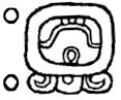 The energy of the day 12 Ajmak may give rise to some form of life review. You may find that your past experiences help you to understand how to bring the sweetness to life today.
The energy of the day 12 Ajmak may give rise to some form of life review. You may find that your past experiences help you to understand how to bring the sweetness to life today.
When the day Ajmak is called during ceremony, it is referred to as the nawal of redemption and it is seen here combined with the number representing all of life’s experiences bundled together. This can be understood as having an energy of both redeeming and asking for redemption for the past in this lifetime. Every day, we hopefully grow a little wiser and understand our less-wise decisions and actions of the past. At the time we made those decisions, we often acted on the best information we had, with our best intentions. However, looking back the result may not have been a choice we would make now.
Today is a day about dropping past regrets, and helping others to drop theirs. It is a day to embrace yourself for all you are, and everything that has shaped you throughout your life, a day of acceptance of the human nature of us all. We can use our past experience to understand why others around us may have committed errors, perhaps they are errors we too have committed in our past. Understanding this can help us to forgive them and in turn help us to release any residual burdens we carry. Allow any bitterness about past events to leave so that the sweetness can come in.
I’m sorry
Please forgive me
Thank you
I love you
When the creators fashioned the four first men, the Bacab’ob, they created them as equals. These four first humans had superhuman abilities, including the ability to see through space and time. As equals were not desired, the gods smoked the mirror of perception, giving us our human set of senses. When we lost the ability to see through time, we lost the ability to see the true consequences of our actions and thus we needed to start asking for forgiveness. Sometimes even well meaning actions can cause problems at a later date. Ajmak represents this ability to forgive others, the ability to forgive ourselves and the ability to accept forgiveness.
Ajmak is a sensual energy, which creates some of the reasons for its needing to be forgiven. It is kind and very lovable, but irresponsible. It can be a very talented energy, with great ideas. However it can also be very easily distracted, especially by anything that makes it feel nice. This often leads Ajmak to failing to fulfil its true potential, although due to its lovable nature it is easy to forgive. One of the lessons with regards to the Ajmak energy is learning to forgive oneself.
The number 12 is the penultimate number. In some ways it can be seen as the last Earthly number, the number 13 representing the spirit world. We travelled through the mortal world with 1 through 6, then the other world with 7 through 12. In this way 12 can be seen as a point of bringing all of the experiences into one bundle for presentation to the spirit world as we step into 13. As such, the number 12 brings a wealth of experience into one place, it is rather like writing an autobiography. It is totality, all that is, brought together.















